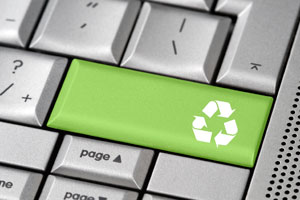
Electronic Waste Warning
LessIsMore.org works best in modern browsers like Firefox, Safari, Chrome, or Internet Explorer 9. All are free to download and will greatly improve your internet experience. If it plugs in, charges up, or takes batteries, it can't be disposed of in your trash because it could harm you or the environment. Find out about electronics regulations.
E-Waste Regulations
Oh, the fun world of regulations! In California, unwanted electronics are classified as hazardous waste when we want to get rid of them. Don't worry though; this doesn't mean they're dangerous when still being used! The problem results when electronics break or are crushed, releasing hazardous materials inside like lead and mercury. To protect the public from these potential dangers, various agencies regulate how electronics can be disposed.
Which California agencies regulate electronic waste?
The primary agency that oversees the disposal of electronics is the Department of Toxic Substances Control (DTSC). Among other duties, DTSC staff are responsible for writing the regulatory language and for inspecting facilities that collect and/or recycle electronic waste.
California's Department of Resources Recycling and Recovery (CalRecycle) also plays an important regulatory role. With the passage of the Electronic Waste Recycling Act in 2003, CalRecycle (formerly the California Integrated Waste Management Board) became responsible for administering the state's Covered Electronic Waste Payment System.
Under this program consumers pay an upfront recycling fee when buying certain "covered" electronic products such as TVs and computer monitors. The collected fees help state-approved collectors and recyclers cover their costs to properly manage the electronics once they become waste.
What about at the federal level?
The U.S. Environmental Protection Agency (EPA) primarily regulates entities that generate large quantities of electronic waste (providing exemptions to households and businesses that produce only small amounts). Additionally, the EPA has special requirements for recycling and/or exporting electronic devices that contain a cathode ray tube (CRT).
Related Materials
- Facility Tours
- Hazardous Waste Regulation
- TVs and Computer Monitors Recycling
- Office Equipment Recycling
- Laptop Computers Recycling
- Portable Electronics Recycling
- Audio-Visual Equipment Recycling
- Cell Phones/Smart Phones Recycling
- Computers & Peripherals Recycling
- Electronics Regulation
Related Articles
-
April 7th Hazardous Waste Collection Event
March 03, 2019 by Leslie Robinson - Hazardous Waste Recycling/Disposal -
“Less Is More” Guide Hot Off the Press
January 18, 2023 by Kaitlyn Haberlin - Recycle, Reduce & Reuse -
America Recycles Day November 15th
November 08, 2019 by Leslie Robinson - Recycle -
Free, Year-Round E-Waste Recycling
February 04, 2020 by Leslie Robinson - Electronics -
2019/2020 Resource Recovery Waste Management Annual Report Now Available!
January 11, 2021 by Tori Kampmann -
Free Electronics Recycling in Santa Barbara County!
February 02, 2021 by Kaitlyn Haberlin - Electronics -
New Year, New Protocol!
February 02, 2022 by Tori Kampmann -
Be Aware of Proper Battery Disposal this Holiday Season
December 12, 2022 by Kaitlyn Haberlin - Hazardous Waste Recycling/Disposal